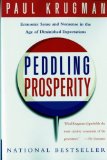 I have been accused of having a man-crush on Paul Krugman. So sue me. He just writes so darned clearly.
I have been accused of having a man-crush on Paul Krugman. So sue me. He just writes so darned clearly.
I backtracked chronologically to read Peddling Prosperity because I wanted to understand the differences amongst Keynesians, Monetarists, Supply-Siders and others. Check. This book was written at the beginning of the first Clinton administration and covers the rise of conservative economic ideology, the record of conservatism in power and then the revival of Keynesianism. In addition to describing Keynesianism and Monetarism, Krugman’s goal is to differentiate between actual economists and mere policy entrepreneurs. So the reader learns about the economic definitions and histories of Keynesianism and Monetarists, and then about the rise of Supply-Siders and later their liberal counterparts, the Strategic Traders. As an economics hobbyist trying to get my arms around the subject in general, I found the book very eye-opening. I wish I had read it earlier in the stream of economics titles I’m reading, both for the historical descriptions of schools of thought and because I think it may have improved my ability to discern the values and motivations of some other writers (Krugman included).
Here’s a positive review with more details on the content, a critical review from a member of the Democratic Study Group, and a longer critique of Krugman’s critiques of Policy Entrepreneurs over the course of several books.
